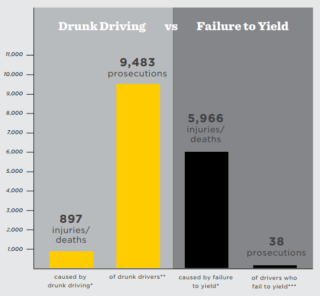This week’s Monday Roundup is sponsored by Lancaster Engineering, a Portland-based traffic engineering and transportation planning firm.
Saturday’s successful finish to the Paris carbon-reduction commitments hovered over a lot of this week’s news, including the bike news. Here are the bike-related links, climatological and otherwise, that caught our eyes this week:
Failure to yield: It causes six times as many traffic injuries as drunk driving (PDF) but is prosecuted 99.6 percent less. (Numbers are from New York state.)
200 miles: That’s what Kurt Searvogel, 52, pedals every single day in his Pop-Tart-fueled campaign to set a world record for distance biked in a year.
Smart car: A Florida woman was arrested for an alleged hit-and-run after her car ratted her out by calling 911 itself.
Cheap oil: Counterintuitively, a big part of the solution to the climate crisis is to keep oil less than $75 a barrel.
Calgary network: Six months after the city opened a downtown protected bike lane grid all at once, bike traffic on the streets has already doubled and 64 percent of Calgarians support the changes.
Vancouver bike lanes: After the failure of a mass transit ballot issue, B.C. business owners and city leaders say that big biking investments are the only viable alternative. They’re planning 12 new bikeways in five years.
San Francisco yield law: The proposed decriminalization of rolling carefully through stop signs on a bike continues to move forward.
Bike tourism: The appeal is spreading, and it comes down to a simple fact: bike tourists spend more money.
Advertisement
Fatality liability: A California city that was ordered to pay $5.8 million to the family of a man killed while biking on a street had not only recently removed a bike lane, it had also rejected a parallel off-street path because it would have run through the city golf course.
Taxi swarm: Dozens of taxis were photographed lining up inside a new protected bike lane in Toronto.
“Dynamic shuttles”: That’s Ford’s phrase for the flexible mass transit system it’s working to develop.
Stuck on gas: As the world’s poor get richer, they’re expected to keep buying gas cars, which is why transportation is the fastest-growing energy-based contributor to global warming.
Auto ban: “Like there is no clean coal, there is no clean car.” So maybe it’s worth remembering that if we wanted to, we could actually ban them.
Pedestrian gradualism: When we plan cities, the sad fact is that “fewer cars don’t necessarily mean more people.” Cities that want to cast off their cars should shrink auto spaces but do so gradually and with care, says one Oslo urbanist.
Beijing crisis: China’s capital shut down factories and forced alternate-day driving in emergency response to a week of smog at “red alert” levels.
Energy reduction: If not for the social and technological changes that followed the 1970s oil shocks, U.S. carbon emissions would be four times higher than they are today. That’s as good of proof as any that we could do it again.
Peace prize: The 2016 Nobel Peace Prize should be awarded to the bicycle, say the hosts of a state-run Italian radio show.
— Michael Andersen, (503) 333-7824 – michael@bikeportland.org


